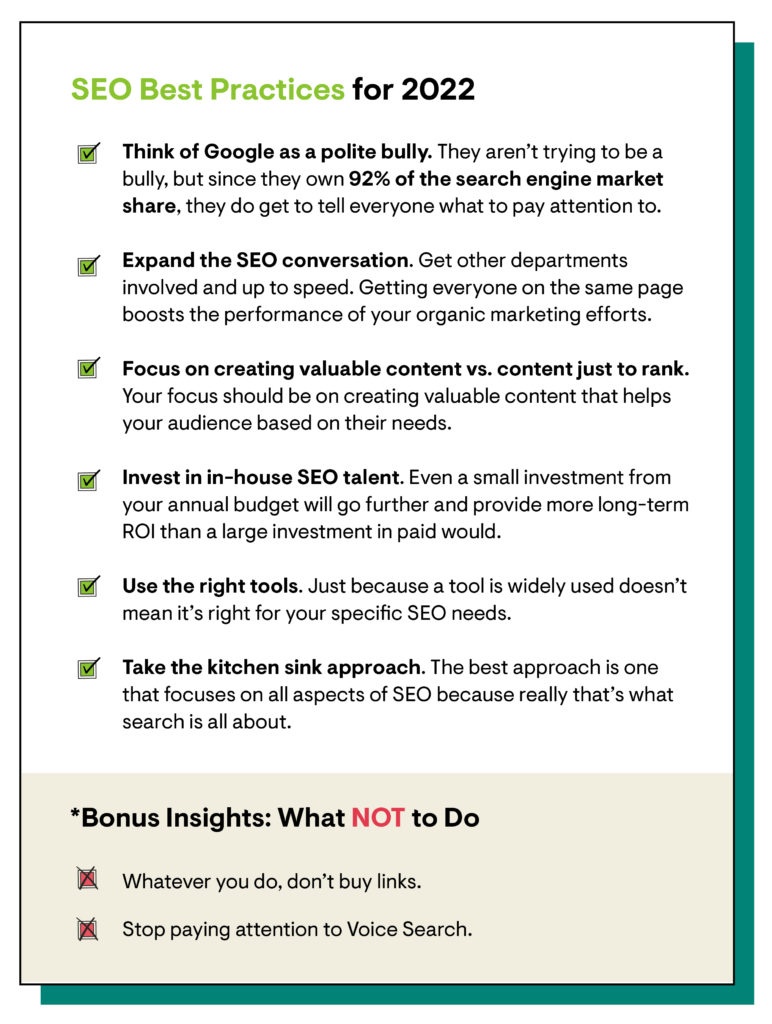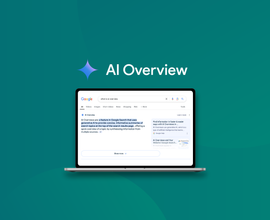The Top SEO Trends of 2022
The most common misconception about SEO from marketers is that it’s dead (for context, this is also one of the go-to jokes from fellow search experts). However, the truth is that SEO was taken for granted in the past because sometimes it works the way you want, but other times, it doesn’t.
When it doesn’t, it’s easy for marketers and decision-makers to focus on the ROI of paid channels that provide instant gratification. But new SEO trends keep coming because no matter how much initial ROI paid channels provide, the main reason your website gets clicks is based on its findability, which is determined by relevance and consumer need at the time.
But if you can’t get that instant gratification from SEO that marketing leaders rely on from other channels to justify spend, is it really worth the investment?
Top 3 reasons SEO isn’t going anywhere in 2022
When asked, my response is always: yes, SEO is 100% worth the investment. And looking at SEO as being dead is really misunderstanding what search engines are and how they work. SEO is complex, more advanced now than ever, and constantly changing. What worked a few years ago or even a few months ago doesn’t work anymore.
And yet, organic traffic accounts for 53% of all website traffic . Whether your executives realize it or not, your organic marketing efforts (and thus your SEO strategy) are the key drivers of how people find your website and eventually convert, which is one of many reasons why SEO isn’t going anywhere in 2022 or the years to come. Plus, when you consider the fact that CPCs are going to continue to increase more and more over time, shifting more investments to organic and content marketingContent Marketing
Content marketing is a marketing discipline with the goal of increasing awareness and scope for products and brands in the desired target group with content published on the web and offline.
Learn more is inevitable.
But let’s dig deeper into the indicators that SEO is not only here to stay but growing in importance and prioritization.
1. Lesson learned from the pandemic: organic is your most reliable channel
The global disruption caused by the pandemic over the last two years produced a surprising insight for many business leaders. After paid spend and marketing budgets were slashed across the board as companies looked to recoup costs wherever possible and survive the economic uncertainty, organic traffic was thrust into the spotlight.
Interest in SEO strategy and organic marketing efforts was suddenly a main focus from the top down because, for many businesses, organic traffic is what kept them afloat. It became the most reliable channel in terms of traffic and conversions. And decision-makers realized just how underfunded and undervalued this primary channel of revenue generation and brand awareness is. As a result, many business leaders realized sheepishly that they should’ve been thinking about organic traffic all along and integrating it more into the overall marketing strategy. They won’t be making that mistake again moving forward.
2. Increase in organic marketing leadership
A key indicator for me that SEO is growing in importance is the increase I’ve seen across the board when it comes to organic marketing representation at the leadership level.
While it’s still rare to see an executive role with SEO in the title, more seasoned SEO experts who really built their career in search and know it well have risen in ranks and are now at the Director and VP-level at enterprise organizations. As a result, they’re able to prioritize SEO in a way we haven’t seen before across a variety of industries.
I’m also seeing more and more SEO speakers at conferences, webinars, and events that aren’t solely centered around SEO. Meaning more and more decision-makers recognize SEO isn’t an optional part of an effective marketing strategy; it’s a key focus, and they need to get up to speed.
3. Almost $300M invested in the SEO industry in 2021
There’s nothing like hundreds of millions of dollars to really get people to take notice. And that’s exactly what happened for SEO in 2021.
SEMrush started the year off strong and really set the tone with the $140M raised for their IPO in early 2021. That definitely caught the attention of anyone now paying attention to or investing in search.
Following that, Conductor closed out the year with an impressive $150M investment round led by Bregal Sagemount. Resulting in the highest fundraising round ever for the industry and a near half-billion-dollar valuation of our enterprise SEO technology platform.
Nearly $300M invested across only two companies in one calendar year is a clear sign that search is the channel to watch. We’re only beginning to see the types of major (read: necessary) investments like these that the organic marketing industry will benefit from in the coming years.
But enough about why SEO is here to stay. Let’s get into what you really came for: upcoming SEO industry trends for 2022 and the SEO best practices to implement now.
How will SEO change in 2022?
Based on what I’ve seen over the last 12 months and 17+ years of experience in the SEO industry, here are the top SEO trends and changes I see coming in 2022.
Renewed importance of the user’s website experience (UX)
What hasn’t changed is Google’s overall emphasis on the website experience (UX) you are providing. What has been true for a while now remains true. When it comes to getting on the first page of SERPs, companies should focus on providing a great web experience—down to every individual page—along with improving overall brand perception online and increasing overall brand presence online.
How you take care of your brand and the UX your site provides is what Google wants to make more of a factor when it comes to who ranks where. While these have always mattered, Google’s algorithm is diving deeper into your page-based experiences and making these a more significant ranking signal. If you know pages of your site have room for improvement, now is the time to update them.
Quick sidenote: I believe links are becoming less of a signal, and I think they will continue to degrade as a ranking factorRanking Factor
The term “Ranking Factors” describes the criteria applied by search engines when evaluating web pages in order to compile the rankings of their search results. Ranking factors can relate to a website’s content, technical implementation, user signals, backlink profile or any other features the search engine considers relevant. Understanding ranking factors is a prerequisite for effective search engine optimization.
Learn more over time. Yes, it’s still one of the core ranking factors, but I believe Google wants to move away from that because of the ways people still manipulate backlinking overall. Google’s algorithm may downgrade the importance of signals like this in the future in favor of your overall site experience.
Third-party cookie elimination reconfirms the need for adaptability
Don’t buy into the doomsday hype of what Google’s elimination of third-party cookiesCookies
Cookies are small text files that are saved on a user’s local computer when browsing and sent back to the server when the user visits the same sites again.
Learn more will mean for your organic traffic. The main takeaway for SEOs and business leaders with this shift should be to rely more on first-party data vs. the historical reliance on buying customer info.
Yes, organic traffic in your SEO KPIs will likely drop for all organizations as some consumers opt out of tracking. But what isn’t new for SEOs is the need for adaptability. So third-party cookies are gone, so what? Think back to 2011 when Google phased out keywordKeyword
A keyword is what users write into a search engine when they want to find something specific.
Learn more reporting and instead bucketed all organic search queries that drove users to your site under the phrase: (not provided). Everyone reacted to the update like it was catastrophic, but SEOs did what we’ve been doing for years: adapt.
What will adapting look like in 2022? A major increase in the reliance on Google Search ConsoleGoogle Search Console
The Google Search Console is a free web analysis tool offered by Google.
Learn more (GSC) for more detailed reporting that Google Analytics (GA) will no longer be able to provide. Along with being more realistic and straightforward with higher-ups about shifting organic benchmarks.
What marketing leaders should take away from the elimination of third-party cookies is that customer data will continue to become less available as privacy regulations become more common. The best channel to replace this loss of third-party data? Search. Meaning SEOs are more important now than ever before.
Instant indexation expands to Google
Instant indexation—known as IndexNow —is a potential game-changer for the entire industry. Created and implemented in 2021 by Microsoft Bing and Yandex, it eliminates the long-standing headache for SEOs of search engines taking days or even weeks to index new pages or updates to your site.
Instead of waiting on websites to re-crawl your site for changes, you can notify them via an API whenever content is created, updated, or deleted. This has major potential for news sites and large eCommerce sites in helping control crawl budgets, getting new products indexed ASAP, and minimizing rogue pages being indexed. As monumental as this update is, it won’t really make waves until Google adopts it as well.
While Google has already started testing this protocol, you can expect the global search engineSearch Engine
A search engine is a website through which users can search internet content.
Learn more leader to continue to test and refine this feature for future release at a to-be-determined date. Right now, they could be waiting to see how the IndexNow protocol works for Bing so they can be sure to test and eliminate any bugs or potential black hat practices before bringing it to market (if they choose to do so). Now is the time to start prepping for it if you want to be ready for if and when they do set a release date.
Prioritization of enterprise SEO from new leadership
One thing I’m excited to see continue to expand in 2022 is the prioritization of SEO at the executive level within enterprise companies, thanks to new leaders who are seasoned in SEO.
As I called out earlier, we’re going to continue to see more search-based roles at the director level and above within global companies. Organic marketing and SEO overall are set to be focused on (and invested in) more than we’ve ever seen before as a result. The undervaluing and dismissal of organic marketing as it relates to your overall marketing strategy could very quickly become a thing of the past. (At least, I hope it will.)
The one constant: continued volatility
While it’s not new for 2022, industry experts can count on continued volatility for the industry given the rapid pace of core google algorithm updates we saw in 2021. We’re already seeing a core Google update every 30 days so expect this trend to continue and even increase for 2022.
How can you prepare? My top tip: don’t be reactive. It’s not about reacting to the algorithm updates as they’re released. It’s about staying informed about current SEO trends, so you’re staying ahead of upcoming changes. Yes, algorithm updates are unpredictable, but for informed experts, they shouldn’t come as surprises. Update releases are simply building on the SEO and Google trendsGoogle Trends
With Google Trends the interest in relevant search terms can be analyzed. This allows search queries to be valued and, over the course of time, such as for the seasonality of search terms, be classified.
Learn more we’ve been seeing. As long as you’ve adopted an agile methodology to your SEO strategy and are keeping tabs on the latest SEO best practices and upcoming trends, you should be well prepared for the constant fluctuations coming our way this year.
SEO Best Practices for 2022
Alright, so we’ve covered why SEO is here to stay and what to expect when it comes to future SEO trends for 2022. Now, let’s recap the SEO best practices everyone in the know should already be following. (If you’re not, it’s time to rethink your strategy to incorporate these ASAP.)

- Think of Google as a polite bully. We’re all out here just trying to keep up with Google. They aren’t trying to be a bully, but when you own 92% of the search engine market share, you pretty much get to tell everyone what to pay attention to, and we have to listen.
- Expand the SEO conversation. A solid understanding of SEO and how search engines work as it relates to organic marketing shouldn’t be limited to the search experts on your marketing team. Get other departments involved and up to speed. Does your social media team understand how social impacts SEO? What about your PR organization? Getting everyone on the same page boosts the performance of your organic marketing efforts.
- Focus on creating valuable content vs. content just to rank. Identifying potential ranking opportunities will always be a part of any organic marketing strategy, but it shouldn’t be the core focus behind your content marketing strategy. Instead, your focus should be on creating valuable content that helps your audience based on their needs. Doing so means you’ll create content that ranks where it matters most: with your audience’s specific search queries.
- Invest in in-house SEO talent. Don’t tell me it’s too expensive. It’s time to invest in your organic channel—it accounts for anywhere from 40% to 70% of the overall traffic to your site—and the talent who know it best. It is more than worth the investment. Even if you can only carve out a small investment from your annual budget, it will go further and provide you with more long-term ROI than a large investment in paid would. And my last tip would be to invest in-house SEO talent vs. outsourcing to an agency. A big problem I see with a lot of organizations that outsource SEO efforts to agencies is that no one internally really understands what the agency is doing and why. Which means your in-house talent isn’t getting the education or training they need to prioritize SEO across multiple channels, so your rankings and content will suffer as a result. Also, outsourcing gives you way less control of both your brand and content.
- Use the right tools. Another one of the biggest mistakes I see organizations make is not investing or identifying the right tools to support their SEO efforts. If you’re not looking at the right things when it comes to data, search analytics, and reporting resources, then you’re setting yourself up for failure. Just because a tool is widely used doesn’t mean it’s right for your specific SEO needs. Drill down into exactly what your needs are, and don’t make sacrifices up front that you’ll regret in the long term.
- Take the kitchen sink approach. Last but not least, the best SEO practice is one that has always been true: adopt ‘the kitchen sink’ mindset. Anyone who tells you to focus on only one aspect of SEO to get results doesn’t know what they’re doing. The best approach is one that focuses on all aspects of SEO because really that’s what search is all about. It’s not just one ranking factor or one content strategy you need to focus on; it’s an ever-evolving, comprehensive list that takes a fully-realized team to cover successfully.
*Bonus Insights: What NOT to Do
- Whatever you do, don’t buy links. This one shouldn’t even have to be said, but here I am saying it. It’s 2022; stop it.
- Stop paying attention to Voice Search. While we’re at it, it’s time to stop paying attention to Voice Search. It’s hyped up by news outlets as the next wave of search, but, for most companies, their customers will continue to use search engines the way they always have: by typing their search queries.
Well, that’s a wrap on all my top tips and upcoming SEO trends to prioritize this year. If you’re looking for more insights and data to get decision-makers on board, download our State of Organic Marketing 2022 Report. Or, if you haven’t had enough of me yet, secure your spot at my monthly 30|30 webinar series, where I recap the last 30 days in content and search in 30 minutes.







